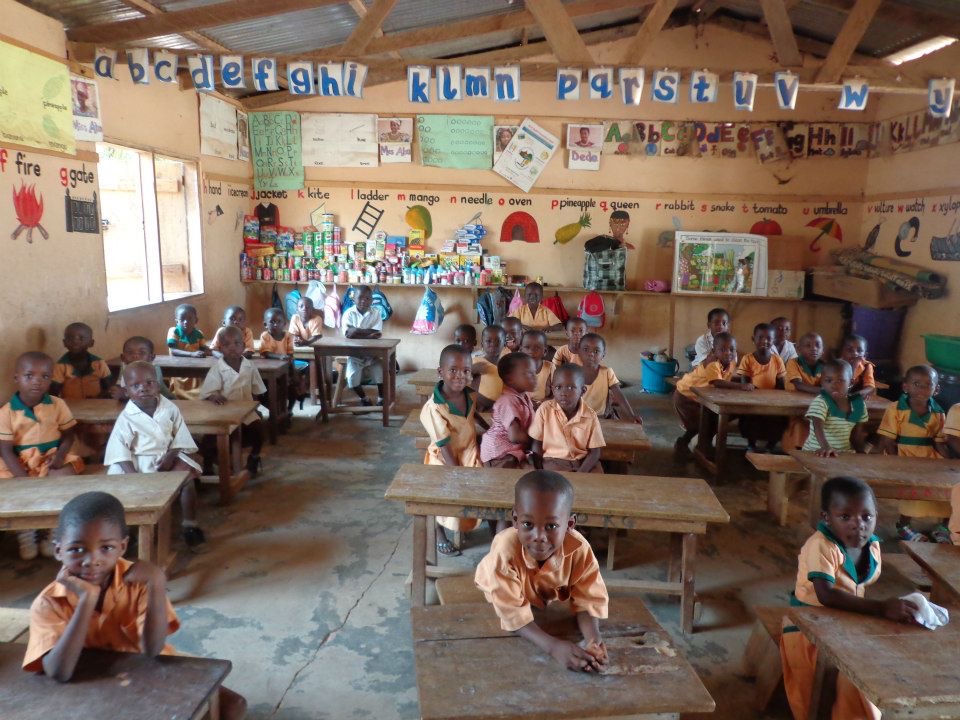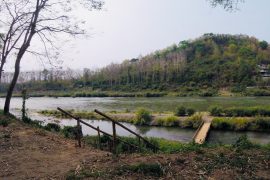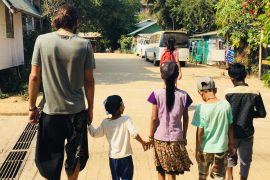In the Education section of the blog, I’ll be talking about my experiences in teaching or observing in different countries. My intentions are to work with kids at some point in every country whether it be in a school setting or small group, a one-time thing or multiple. Being a teacher it’s always really interesting to see how another culture educates their youth.
Many cultures have a way of life that as the children grow up, it’s very predictable as to what they will be doing, because it may be decided for them. Education is the source to breaking the cycle of poverty. English is a language that is being learned in even the smallest of villages. I wasn’t happy teaching in elementary schools in the U.S. so before traveling to Ghana I always questioned why I spent so many years in college working on a degree that I had no interest in anymore. Then I had the privilege of seeing what it was like to work with kids from a culture much different than mine. It all began to make sense, I spent 4 years of college to get a teaching degree so that I could travel and be guaranteed a job anywhere I went. Teachers are always needed and valued outside of the U.S, but I’ve come to find that children are the real teachers. I’m setting intentions now to attract all the right experiences to help me grow as an educator.
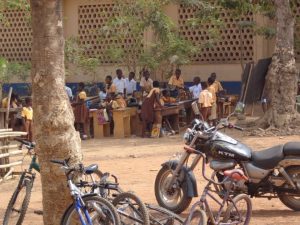 My first time observing was in Ghana back in 2013. In order for these children to have some type of success, education is key. Children need to be in school or they will be roaming the streets and getting into trouble. I observed at an elementary school right down the road from where I was staying. When I stepped onto school grounds a crowd of children ran up and surrounded me, touching my freckles while smiling and laughing. All of the children have to wear uniforms and are responsible for keeping track of and washing them. If they come to school without their uniform, they risk being sent home. Unless they go to a private school, their head needs to be shaved bald.
My first time observing was in Ghana back in 2013. In order for these children to have some type of success, education is key. Children need to be in school or they will be roaming the streets and getting into trouble. I observed at an elementary school right down the road from where I was staying. When I stepped onto school grounds a crowd of children ran up and surrounded me, touching my freckles while smiling and laughing. All of the children have to wear uniforms and are responsible for keeping track of and washing them. If they come to school without their uniform, they risk being sent home. Unless they go to a private school, their head needs to be shaved bald.
The classrooms have multiple windows on both sides so the air flows better because it’s often very hot when the sun is blazing. Daily there would be one or two classes being taught outside. I observed mainly in the primary classes, around 4-6 years old. The walls were decorated with hand-painted ABC’s and drawings and the back wall of the room was lined with food. There was one teacher per class and about 35-50 students. The teachers prepared songs that the students sang to me, welcoming me to their classrooms. It was the sweetest! When the children had break time they would all rush outside to bang around on the drums or play in the field with the balls. The children were generally well behaved and respectful.
That’s one thing I really love about Ghanaian culture, children want to learn and are grateful for the opportunity to.
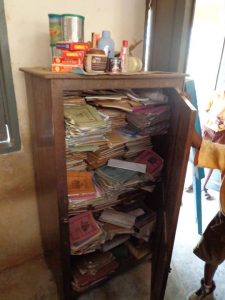 I didn’t observe too much during my time in Ghana so I don’t know the curriculum that is taught but I do know that teachers do their best with what they are given. In one of the classrooms, there was one laptop that the children used to practice their typing, with 5 or 6 children surrounding the desk waiting for their turn. Understanding how to use the computer is an important skill to know and although they don’t have a computer lab with multiple computers, they make use of the materials that they do have. I definitely didn’t expect to walk into a room with a laptop, so this was a shock to me. There were no materials to use, but somehow there was a laptop at the front of the class which didn’t make sense to me. Later I found out that it was one of the staffs and they shared it between multiple classes. Children getting the opportunity to use a computer is very slim unless they are a bit older and can afford to go to a local Internet cafe, so they were very eager to get the chance to type. Depending on the money your family has and the resources the school has, you may or may not have books. In one of the rooms, there was one teacher holding up a book for about 40 students to see. I think the teachers have a harder time keeping children engaged due to the lack of materials they have to work with. This is probably why many lessons incorporate movement and song, because it’s easy and doesn’t require money. Children are given a notebook to write their homework and notes in, likely to be something that they have to purchase on their own. In between lessons they are often put into crowded cabinets.
I didn’t observe too much during my time in Ghana so I don’t know the curriculum that is taught but I do know that teachers do their best with what they are given. In one of the classrooms, there was one laptop that the children used to practice their typing, with 5 or 6 children surrounding the desk waiting for their turn. Understanding how to use the computer is an important skill to know and although they don’t have a computer lab with multiple computers, they make use of the materials that they do have. I definitely didn’t expect to walk into a room with a laptop, so this was a shock to me. There were no materials to use, but somehow there was a laptop at the front of the class which didn’t make sense to me. Later I found out that it was one of the staffs and they shared it between multiple classes. Children getting the opportunity to use a computer is very slim unless they are a bit older and can afford to go to a local Internet cafe, so they were very eager to get the chance to type. Depending on the money your family has and the resources the school has, you may or may not have books. In one of the rooms, there was one teacher holding up a book for about 40 students to see. I think the teachers have a harder time keeping children engaged due to the lack of materials they have to work with. This is probably why many lessons incorporate movement and song, because it’s easy and doesn’t require money. Children are given a notebook to write their homework and notes in, likely to be something that they have to purchase on their own. In between lessons they are often put into crowded cabinets.
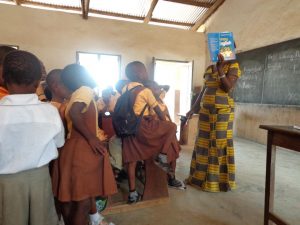
We also took a short trip to Aklorbortornu, a rural village of 300 farmers and fishermen in Ghana’s Volta region. Currently, there is no electricity or running water. Other then the light of the sun, lanterns are used and water is fetched at the closest water source. If the children want to attend school they have no choice but to walk several miles to the closest village. This “nearby” school is falling down and lacks qualified teachers in addition to basic materials like pens and paper. Teachers are as unreliable as the government that pays their salaries. Sometimes they show up, and sometimes they don’t. Children from Aklorbortornu often carry their own chairs and desks on their backs on this long journey. Otherwise, they have to sit on the dirt floor. We came to the village with donations of school supplies to find that a local woman has been volunteering her time teaching the village children. They were learning under a wooden shelter created with sticks, logs and palm tree branches for the roof. If it rains, the children don’t go to school, which is a problem during rainy season. The materials donated were from the Western New York community, even the smallest amount of donations are appreciated in a place where they have very little. You can read more about the village of Aklorbortornu and other projects on the Ndor Eco Village website.
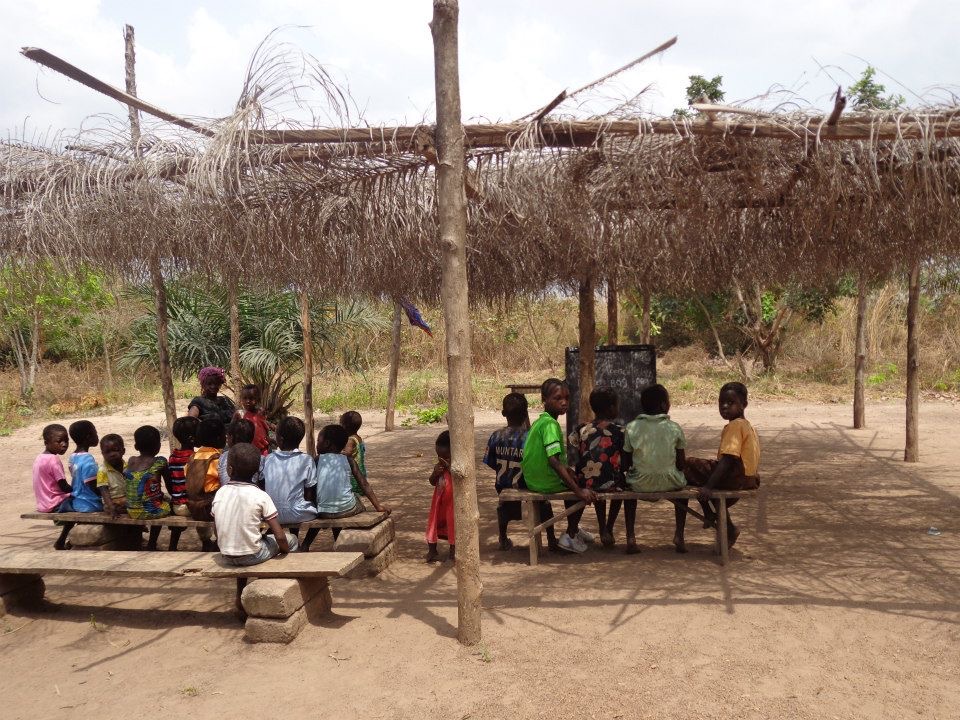
Getting the opportunity to observe was an eye-opener for me in many ways. Although I don’t agree with the American Education system, we do have many privileges that we often take for granted, mainly because of a lack of comparison. If all teachers, coaches, and school staff working in U.S. schools were to travel to a 3rd world country and experience education, their perspective on many things would change. One is how freeing it is to work with children that want to learn with more flexibility on curriculum and less paperwork. Secondly, how lucky we are to be given so many materials to work with and the ability to have access to anything that we do need. Many American teachers spend a lot of their own money toward items for their classrooms but I think after observing a classroom that has next to nothing, they would re-think what is necessary to have and what is a luxury. In my personal opinion, I would rather teach in a foreign country rather than a classroom in the United States. Teachers are not only respected more by students but also valued overall. I think our Education system in the U.S. is strong in content but lacks the human aspect of it all. I know many wonderful teachers that teach in American schools and they go above and beyond what is asked of them for the sake of the children. They are genuinely loving and teach kindness and compassion within their classrooms and as you can see by all the news stories, this is highly needed within our schools. Experiencing education in Ghana has revealed to me my own teaching path. I don’t think I fit in with a typical public school system, I’m definitely suited more for an alternative, think out of the box environment. I look forward to many other experiences in many different countries and am blessed to have been given this opportunity.
We also have more pictures on Facebook.

